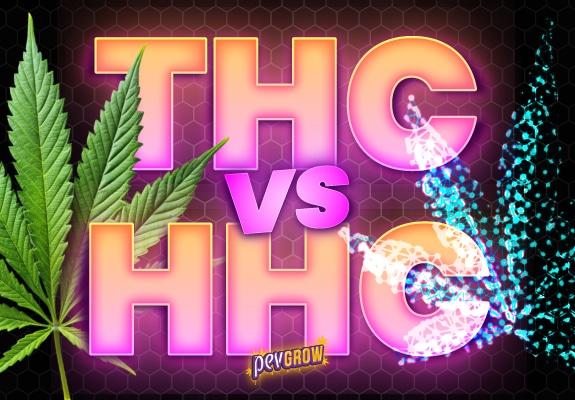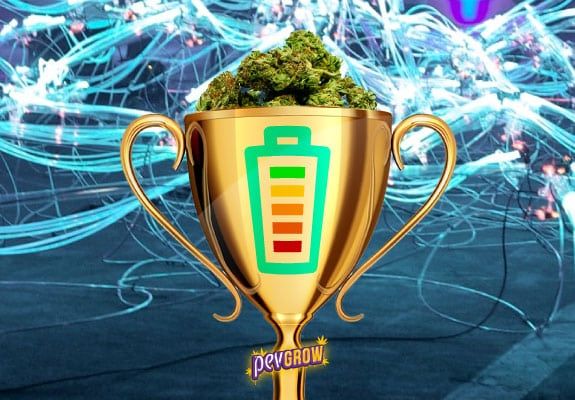- Increase THC Levels and the Potency of Your Cannabis
- HHC Vs Delta 8: Differences Between These 2 Psychoactive Cannabinoids


30-09-2024 06:48:40 - Updated: 30 September, 2024
The world of cannabis continues to expand, and with it, the diversity of cannabinoids available to consumers. Two of the compounds currently capturing attention are HHC (hexahydrocannabinol) and THC (tetrahydrocannabinol). Both have notable similarities but present significant differences in terms of effects, legality, and therapeutic potential. If you are wondering which of these cannabinoids is better for you or if you simply want to learn more about these two substances, you are in the right place.
In this article, we break down all the key differences between HHC and THC, analyzing their psychoactive effects, medicinal uses, associated risks, and other crucial aspects to help you make an informed decision. First, let’s give a brief overview of how these cannabinoids are separately.
🧪 What is THC?
THC (tetrahydrocannabinol) is undoubtedly the most well-known and studied cannabinoid in cannabis. Discovered in 1964, it is primarily responsible for the psychoactive effects that most people associate with weed consumption. Specifically, Delta-9 THC is the most common and potent form of this compound, although there are also variants like Delta-8 THC and Delta-10 THC, which have milder psychoactive properties. If you want to delve deeper in this regard, I recommend reading this article that explains what THC is in much more detail.
🏹 How Does THC Work?
THC primarily binds to the CB1 and CB2 receptors of the body’s endocannabinoid system. These receptors are found in the brain and nervous system, which explains why the effects of THC include alterations in mood, perception, and motor skills. In more technical terms, THC mimics the effects of the body’s natural endocannabinoids, resulting in a “hyperactivation” of cannabinoid receptors.
🥇 Effects of THC on the Body
THC has a wide range of effects, many of which are responsible for its popularity, both for recreational and medicinal use. Some of the most common effects include:
- Euphoria: A feeling of happiness or general well-being.
- Alteration of sensory perception: Changes in the perception of time, space, and colors.
- Muscle relaxation: Relief from physical and mental tension.
- Increased appetite: Commonly known as “munchies,” THC stimulates hunger.
- Short-term memory alteration: It may make it difficult to remember recent events or focus on specific tasks.
- Anxiety or paranoia (at high doses): While many people experience deep relaxation, at higher doses or in sensitive individuals, THC can cause anxiety.
If you are wondering how long these effects last, I must tell you that it depends on many factors, and to avoid going into too much detail here, I recommend reading our article titled How Long Does THC Last in Our Body?
⚠️ Therapeutic Uses of THC
THC is used to treat a variety of medical conditions due to its analgesic, anti-inflammatory, and neuroprotective properties. Some of the most common therapeutic applications include:
- Relief from chronic pain: THC is an effective analgesic, especially for patients suffering from chronic diseases like arthritis or fibromyalgia.
- Control of nausea and vomiting: It is often prescribed to patients undergoing chemotherapy to reduce these side effects.
- Appetite stimulation: It is very useful for patients with cancer or HIV who suffer from loss of appetite.
- Treatment of neurological disorders: In cases of multiple sclerosis, THC helps reduce muscle spasticity.
- Treatment of insomnia: In small doses, THC can be sedative and help improve sleep.
Here is another article from our blog where you can see how to extract THC and all the uses it can have.
👾 What is HHC?
HHC (hexahydrocannabinol) is a lesser-known cannabinoid but is gaining popularity due to its unique profile. It is a semi-synthetic cannabinoid derived from THC through a process called hydrogenation, where THC is converted into HHC by adding hydrogen atoms. This process makes it more stable and resistant to oxidation and heat, prolonging its shelf life.
Although HHC is present in small amounts in the cannabis plant naturally, most of the HHC on the market is produced in laboratories. This cannabinoid is relatively new, which means we are still learning about its effect profile and therapeutic potential. There are many other facts you can learn about this revolutionary cannabinoid, and if you want to discover them, you cannot miss reading this article that explains what HHC is, its effects, legality, etc.
✅ How Does HHC Work?
HHC acts similarly to THC, binding to the CB1 and CB2 receptors of the endocannabinoid system. However, its affinity for these receptors is lower than that of THC, resulting in milder psychoactive effects. This makes HHC an attractive option for people who want the benefits of cannabis but prefer a less intense experience. Right now, there are HHC shops offering all kinds of products rich in this cannabinoid, here are a few examples:
🔥 Effects of HHC on the Body
The effects of HHC are milder than those of THC, making it an interesting alternative for those seeking a more relaxed experience. Some of the most common effects of HHC include:
- Mild euphoria: Similar to THC but with a less intense feeling.
- Deep relaxation: Relaxation both physical and mental, without reaching deep sedation.
- Improvement in mood: HHC can enhance mood but without the emotional peaks that THC sometimes causes.
- Greater mental clarity: Unlike THC, HHC does not tend to affect concentration or memory as significantly.
- Lower risk of anxiety or paranoia: Many people who are sensitive to THC and experience anxiety may find HHC a safer alternative.
If you are wondering if this cannabinoid has unwanted or negative effects, I must tell you that yes, and if you want to see them in depth, follow this link and read our article titled “Short and Long-Term Side Effects of HHC”. It is a short article that you will finish in less than 5 minutes, and thus you will have a broader view of hexahydrocannabinol.
💎 Potential Therapeutic Uses of HHC
As a newer cannabinoid, there is still not as much clinical research on the medical benefits of HHC as there is for THC. However, early research and testimonials suggest that HHC could have several applications:
- Stress relief: HHC appears to be very effective in reducing stress and mild anxiety without the sedative effects of THC.
- Relief from mild to moderate pain: Although it is less potent than THC, HHC can still provide effective relief for minor pains.
- Improvement in sleep: At higher doses, HHC may help people fall asleep more quickly and deeply.
- Reduction of inflammation: Some studies suggest that HHC could have anti-inflammatory properties, although this requires further research.
🔰 Detailed Comparison: HHC vs THC
Although both HHC and THC share similarities, it is important to highlight their key differences. Below is a comparative table for clearer visualization:
| Feature | HHC | THC |
|---|---|---|
| Chemical Nature | Semi-synthetic | Natural |
| Source | Derived from THC (hydrogenation) | Present in cannabis plants |
| Psychoactive Potency | Milder | High (especially Delta-9 THC) |
| Effects | Mild relaxation, mental clarity | Euphoria, sensory alteration |
| Legality | Varies by region | Regulated or illegal in many countries |
| Duration of Effects | Moderate | Prolonged |
| Anxiety Risk | Low | High at elevated doses |
| Availability | Primarily in synthetic products | Natural or synthetic products |
🦋 Legality: Is HHC More Legal Than THC?
One of the most frequently asked questions is the legality of these cannabinoids. Both HHC and THC can be found in a “legal gray area,” depending on the country or state you are in.
Legality of THC
THC, in its most common form (Delta-9 THC), is illegal in many parts of the world due to its potent psychoactive effect. However, in some countries and states where cannabis has been legalized for recreational or medicinal use, THC is legal under certain regulations.
On the other hand, variants like Delta-8 THC have exploited legal loopholes to be sold in some jurisdictions. Although its chemical structure is similar to that of Delta-9 THC, Delta-8 is less potent and, in some regions, is not subject to the same restrictions.
Legality of HHC
HHC is even newer to the market, which means its legal status is not as clearly defined as that of THC. In many regions, since it is not technically THC, HHC is not subject to the same strict regulations. However, this situation may change as regulatory authorities catch up with this new compound.
In summary, if you are concerned about legality, it is important to research local laws before acquiring products containing HHC or THC.
🏞️ HHC or THC for Recreational Use?
The choice between HHC and THC for recreational use will largely depend on the experience you are seeking. If you prefer a mild, relaxed experience with a lower risk of anxiety, HHC might be your best option. On the other hand, if you are looking for intense psychoactive effects and a deeper experience, THC remains the most potent cannabinoid.
Recreational and Medicinal Uses
| Use | HHC | THC |
|---|---|---|
| Pain Relief | Moderate | Intense |
| Relaxation | Mild relaxation | Deep relaxation |
| Anxiety | Lower risk of anxiety | Elevated risk in sensitive individuals |
| Appetite Stimulation | Less potent | Stimulating effect |
| Sedative Effects | High doses may induce sedation | Highly sedative at high doses |
⛳ Side Effects of HHC and THC
Like any cannabinoid, both HHC and THC can have side effects. Although HHC is less likely to cause severe adverse effects, it can still produce some mild inconveniences.
Side Effects of THC
- Anxiety and paranoia: Especially at high doses.
- Dry mouth: Common in almost all cannabinoids.
- Red eyes: Also known as “bloodshot eyes.”
- Increased heart rate: Can be concerning for those with heart conditions.
- Coordination problems: Difficulties performing fine motor tasks.
Side Effects of HHC
- Dry mouth: Mild but present.
- Fatigue: At higher doses, it may cause tiredness.
- Dizziness: Some people report feeling a bit dizzy, although this is rare.
⭐ Does HHC Show Positive for THC?
HHC (hexahydrocannabinol) is a cannabinoid different from THC, but since it is a relatively new compound on the market, its impact on drug testing has not been widely researched. However, based on available information and early user experiences, HHC could yield a positive result in drug tests looking for THC, such as urine, saliva, or blood tests.
Why Might HHC Test Positive for THC?
- Structural similarity: HHC is a hydrogenated form of THC. Although it has some differences in its chemical structure, it still shares a similar base, which may cause the body to metabolize it similarly to THC.
- Common metabolites: Drug tests generally look for THC metabolites in the body rather than THC itself. It is possible that HHC produces metabolites that are detected as THC by standard tests.
- Lack of differentiation in tests: Most drug tests are not designed to differentiate between different cannabinoids. Therefore, if your body produces a metabolite similar to THC after consuming HHC, you could get a positive result.
What Types of Tests Can Detect HHC as THC?
- Urine tests: These are the most common and primarily detect THC metabolites, such as THC-COOH. It is likely that urine tests cannot differentiate between THC and HHC if the latter produces similar metabolites.
- Blood tests: Although they detect the presence of active THC in the bloodstream, they could also confuse it with HHC metabolites if they are similar.
- Saliva tests: This type of test also looks for active THC, but it may be less sensitive to differentiate between HHC and THC.
If you want to see how long cannabis lasts in tests, in this article you can see the detection time of cannabis in urine tests.
✨ Considerations for Those Consuming HHC
If you are in a situation where you are regularly subjected to drug testing (for example, for work or legal reasons), it is important to keep the following in mind:
- Lack of research: Although HHC is a cannabinoid that is becoming popular, there is little conclusive research on how it interacts with drug tests.
- Precaution: Since current drug tests are designed to detect THC and its metabolites, and HHC may produce similar metabolites, there is a real risk of obtaining a positive result, even if you have only consumed products with HHC.
🌼 Editor’s Opinion: Which is Better?
After examining both cannabinoids, it is clear that both HHC and THC have their own merits. If you are a regular cannabis consumer and enjoy the intense effects of THC, you will likely continue to prefer this cannabinoid for its power and efficacy. However, if you are new to the world of cannabis or seek a lighter experience without the anxiety or paranoia side effects that THC can sometimes cause, HHC could be an excellent alternative.
From my personal perspective, HHC is an excellent option for those looking to relax after a long day without being completely “knocked out.” Its milder effect profile makes it perfect for beginners or for those who want the therapeutic benefits of cannabis without the characteristic “high” of THC.
🧐 Frequently Asked Questions (FAQ)
Which is Stronger, HHC or THC?
THC is significantly stronger than HHC in terms of psychoactive effects. HHC offers a milder, more relaxed experience.
Is HHC More Legal Than THC?
The legality of HHC varies by region. In some places, its legal status is ambiguous, but in general, it is not as regulated as THC.
Does HHC Have the Same Side Effects as THC?
Yes, although they are less pronounced than those of THC. The most common side effects include dry mouth and mild fatigue at high doses.
Does HHC Show Up in Drug Tests Like THC?
It has not yet been confirmed whether HHC shows up in standard drug tests, but it may be detectable in certain types of tests.






After reading the article, I now understand that HHC and THC are different in their effects and legality, which will help me make better choices for my cannabis products.